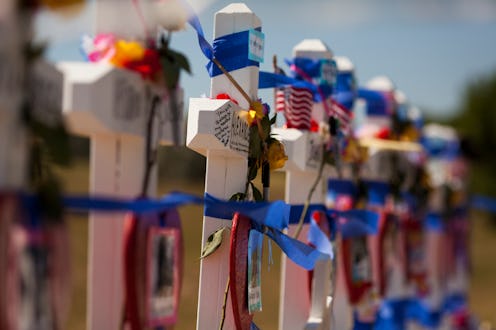News
1 Group Wants To Stop Killers From Becoming Celebs
The man accused of killing 12 people and injuring dozens of others at a movie theater in Aurora, Colorado, was convicted Thursday of all 165 counts against him. But there's one group out there that doesn't want you to say his name. The "No Notoriety" campaign was an attempt by victims and their families to urge the media to focus on the victims' names, rather than the killer, so that mass murderers don't receive the celebrity and attention they so often seek. The challenge to the media asked journalists to not gratuitously cover the trial and overuse the name of the shooter, but to instead consider "social responsibility and compassion" over ratings and sales.
The campaign was first known as The Alex Teves Challenge. Teves was a 24-year-old who was shot and killed during the Aurora shooting while shielding his girlfriend, Amanda Lindgren, from the gunfire. His parents, Tom and Caren Teves, urged the media and the public to focus on the victims in an interview with Anderson Cooper shortly after their son's death. Soon it became an official challenge to the media, and then the request became a full-fledged campaign called No Notoriety. On January 18, 2015, as media began to prepare to cover the Aurora trial, Teves' parents sent out a letter to many news organizations asking that they follow the "suggested media protocol."
The media protocol calls for journalists to do four main things: 1) Limit the name and likeness of the accused individual after initial identification, 2) Refuse to publish photos or self-serving statements of the individual, and instead elevate the names and likenesses of victims to show "their lives are more important than the killer," 3) Realize that possible infamy could be a reasoning for other individuals to kill people, and 4) Promote data and analysis from experts in mental health, public safety, and other professions that help eliminate the motivation behind mass murder. The Teveses wrote:
The reasoning behind this is to deprive the mass murderer of any notoriety. This kind of infamy is one of the motivating factors for copycat killers in this nation. It is also hurtful for the victims of these massacres. By implementing the suggested media protocol on NoNotoriety.com, it will not harm your reporting in any way. Rather, you will be sending a strong message out to others thinking about carrying out a similar attack: “You will not receive fame in this way anymore.”
In April, the movement against notoriety for alleged killers grew. Victims of nine mass shootings — Aurora, Columbine, Virginia Tech, Northern Illinois University, Tucson, Newton, Oak Creek Sikh Temple, Alturas, and Isla Vista — and their relatives issued a collective letter and press release to the media asking for a change in how accused mass murderers are reported on. Caren Teves said at the time:
The media has a tremendous responsibility because they have the unique power to initiate change by valuing and elevating the victims, while at the same time taking away a known motivating factor of notoriety these killers crave. By doing so, media executives, reporters and editors will also show compassion and respect for those of us whose loved ones were killed or injured in these tragedies. For the families whose loved ones were killed and injured, anything else, is just re-victimization.
It's an important point; too many journalists — myself included — can tend to fall into the habit of talking more about those who allegedly took lives than those who died. And a step back to think about the power and effect that the media can have is something taught in every Media Ethics 101 course. But at the same time, there is a story to be told. Laura Castañeda, a professor at the USC Annenberg School of Journalism, told Deadline that she sees both sides of the argument. While she agrees that media coverage of cases such as the Aurora shooting can tend toward the sensational and that the public wouldn't lose much if they didn't hear the accused killer's name over and over, at the same time, she thinks it's OK to run the name, and really it comes down to each newsroom having a nuanced discussion over its choices.
Journalists, as Tom Teves points out, are taught to do no harm. And if victims and their families are saying they're being hurt by the media focusing on the shooter, rather than those who were shot, it's something to pay attention to — which is exactly what No Notoriety is all about. Eric Mace, whose daughter was killed in the NIU shooting, signed the collective letter from No Notoriety and said his daughter was a mere footnote in a television special that focused on the shooter. He told Deadline:
We remember Hitler, but not all the people he killed. I think it should be the other way around. If you’ve done something so bad to be considered a felon, you lose your right to vote. I think that if you do something so evil as to kill a lot of people, you should lose your right to have a face and a name.
Images: Getty Images (3)
